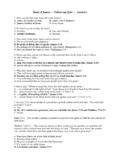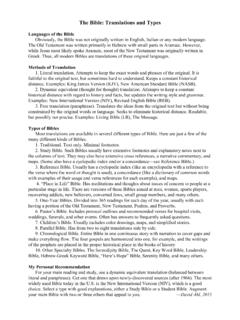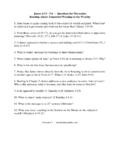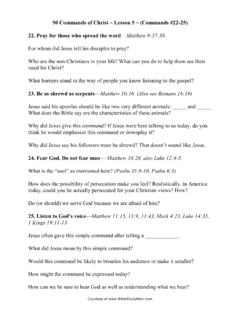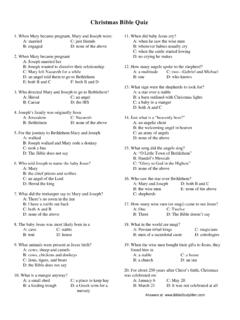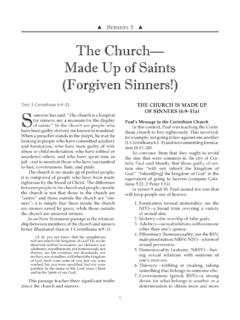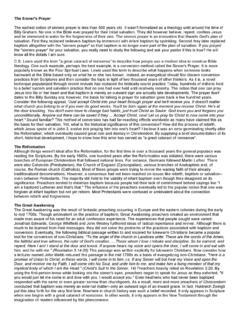Transcription of Jesus’ Parables in Chronological Order Parable #29 — Luke ...
1 jesus Parables in Chronological OrderParable #29 Luke 15:3-7 The Lost SheepThen jesus told them this Parable : Suppose one of you has a hundred sheep3 4 and loses one of them. Does he not leave the ninety-nine in the open country andgo after the lost sheep until he finds it? And when he finds it, he joyfully puts it5 on his shoulders and goes home. Then he calls his friends and neighbors together6 and says, Rejoice with me; I have found my lost sheep.
2 I tell you that in the7 same way there will be more rejoicing in heaven over one sinner who repents thanover ninety-nine righteous persons who do not need to #30 Luke 15:8-10 The Lost Coin Or suppose a woman has ten silver coins and loses one. Does she not light a8 lamp, sweep the house and search carefully until she finds it? And when she finds9 it, she calls her friends and neighbors together and says, Rejoice with me; I havefound my lost coin. In the same way, I tell you, there is rejoicing in the presence10 of the angels of God over one sinner who repents.
3 New International Version (NIV) Parable #29 Luke 15:3-7 The Lost Sheep1. jesus told two previous Parables about sheep (Matthew 18:12-14, John 10:1-18). In the first, he contrasted the sheep to little ones (children, seekers). In thesecond, he contrasted the sheep to ones who know him (followers, Christians). Inthis Parable , to whom does he contrast the herd of sheep? The lost sheep?2. Sinner is not a word that often comes up in casual conversation. What comesto mind when you hear the word? What word(s) would we more likely use to referto a sinner today (crook, criminal, wrongdoer, evildoer, offender, embezzler,scamster, perp, or _____)?
4 Do any modern words really describe the concept?3. What does the word sin mean? Does it mean something different to differentreligious groups (Jews, Roman Catholics, Buddhists, Protestants, Christians)?4. Who was jesus audience for this Parable ? (15:1-2)5. How are we like sheep? In what ways do we go astray?6. jesus says the shepherd will hunt for a lost sheep and bring it home and therewill be rejoicing. But in Verse 15:7, he implies that a lost sinner must do oneadditional thing that a sheep does not have to do. What is it that we need to do?7. How does the picture of rejoicing in heaven over repentance make you feel?
5 Parable #30 Luke 15:8-10 The Lost Coin1. What value did the woman place on each coin? Why did she look so hard for it?2. How is a repentant sinner like a found coin? Why does God care so much aboutrepentant sinners ?3. How many repentant sinners does it take to cause heavenly rejoicing? How doesthat make you feel?4. In what ways does God s value of people differ from ours? Who would yourejoice more over accepting jesus as savior, a close family member or a scavengerin the Guatemala City Garbage Dump? (Be honest!)Courtesy of #29 Luke 15:3-7 The Lost Sheep Leader s NotesBefore going to the questions, an observation.
6 In traditional Roman CatholicBibles (especially before 1920), verse 7 is translated as: I say to you, that even sothere shall be joy in heaven upon one sinner that does penance more than uponninety-nine just who do not need penance. The difference of doing penance(earning forgiveness and salvation) rather than repenting (accepting God s gift offorgiveness) is quite jesus told two previous Parables about sheep (Matthew 18:12-14, John 10:1-18). In the first, he contrasted the sheep to little ones (children, seekers). In thesecond, he contrasted the sheep to ones who know him (followers, Christians).
7 Inthis Parable , to whom does he contrast the herd of sheep? The lost sheep?In this Parable , jesus compares the flock of 99 who were not lost with righteouspeople who do not need to repent. Actually, the word righteous means rightwith God, which means those people who have already repented and receivedforgiveness and mercy from God. No one is totally free from sin at some pointeveryone must repent and be born again, But even after being born again, beingaccepted by God and receiving eternal salvation from him, we still shouldcontinue to repent of our sins and ask God to continue forgiving lost sheep in the Parable is the lost sinner who has not already repented.
8 Orit might possibly even be one who had been born again and then deliberatelyturned his back on the the difference between this and the other lost sheep Parables there areseveral reasons that a person may not be part of the kingdom of Sinner is not a word that often comes up in casual conversation. What comesto mind when you hear the word? What word(s) would we more likely use to referto a sinner today (crook, criminal, wrongdoer, evildoer, offender, embezzler,scamster, perp, or _____)? Do any modern words really describe the concept?3. What does the word sin mean? Does it mean something different to differentreligious groups (Jews, Roman Catholics, Buddhists, Protestants, EvangelicalChristians)?
9 Sin is a term used mainly in a religious context to describe an act that violates amoral rule or one of God s laws. Commonly, the moral code of conduct is decreedby a divine is often used to mean an action that is prohibited or considered wrong; insome religions (notably some sects of Christianity), sin can even refer to a state ofmind rather than a specific action. Colloquially, any thought, word, or actconsidered immoral, shameful, harmful, or alienating might be termed sinful. In Biblical Christianity, sin is portrayed as not following God s moral guidance,based on the account of Adam and Eve in the Book of Genesis.
10 They disobeyedGod by eating the fruit of the Tree of the Knowledge of Good and Evil, whichgave them the ability to judge and know good from evil for themselves. Thus, themoment Adam and Eve ate the fruit from the tree which God had commandedthem not to do sinful death was born; it was an act of disobedience, thinkingthey could become like gods, that was the sin. However, because Eve wasdeceived, while Adam was not, it is usually believed that Adam held the greatestresponsibility for the evil that took place, for which reason the Fall of man isreferred to as the sin of Adam. The Greek word in the New Testament that is translated in English as sin ishamartia, which literally means missing the target.


